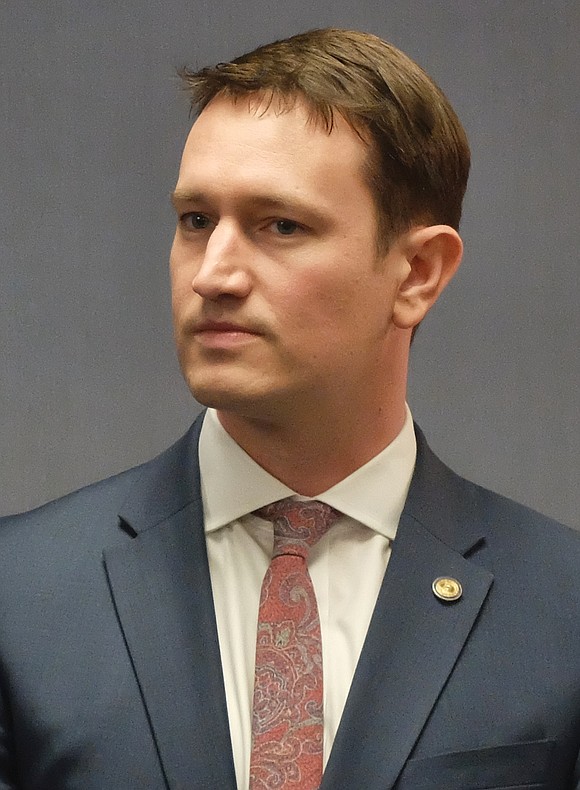Move toward collective bargaining for city employees on pause
Jeremy M. Lazarus | 2/10/2022, 6 p.m.
Richmond City Council hit the pause button on collective bargaining Monday in a bid to gain answers to questions about the potential cost.
Two proposed ordinances that would allow City Hall employees to unionize and negotiate wages, benefits and working conditions are now on City Council’s agenda, but the members agreed to delay further consideration until early March.
While every council member endorsed the concept during the Organizational Development Meeting, they expressed concern about rushing too quickly into a potentially huge change in city management-employee relations.
“We want to get this right,” said 2nd District Councilwoman Katherine Jordan.
Among the issues confronting the council is which piece of legislation to go with.
One, from Mayor Levar M. Stoney, would initially limit unionizing and collective bargaining to refuse collectors, street pavers, pipe-fitters and others labor and trades employees in the city Public Works and Public Utilities departments.
The other ordinance, from 4th District Councilwoman Kristen Nye (formerly Larson) and 8th District Councilwoman Reva M. Trammell, would allow all eligible city employees to enroll in unions, with separate bargaining units for different types of employees, such as administrative professionals, public safety employees, professionals and labor and trades workers.
Lincoln Saunders, the city’s chief administrative officer, is hoping the mayor’s slower approach is adopted. That would give City Hall the opportunity to gain experience with collective bargaining rather than being overwhelmed by dealing with various bargaining units representing a range of employees.
Mr. Saunders told the council that localities in Northern Virginia are spending about $1 million a year to hire staff needed to handle employee bargaining.
Council Vice President Ellen F. Robertson, 6th District, urged her colleagues not to rush so they can estimate the impact this new approach to employee relations could have on the new city budget Mayor Stoney will present in early March. She also urged Ms. Nye and Ms. Trammell to work with the Stoney administration to come up with a compromise for the council to consider.
Richmond is among a handful of localities that have considered or approved collective bargaining since a new state law allowing it went into effect last May. By a recent vote of the Richmond School Board, Richmond Public Schools is the first school district in Virginia to authorize its employees to engage in collective bargaining.
The council is under significant pressure to put collective bargaining in place in large part because of the issues involving pay and working conditions for city employees.
Among the 25 people who spoke during a public comment period Monday was Hannah “Mel” Borja, a policy analyst for the Commonwealth Institute for Fiscal Analysis (CIFA), a Richmond-based think tank that uses research and data to promote racial and social justice.
Ms. Borja said a new CIFA study released Jan. 27 found that 1 in 12 city workers makes too little to live in Richmond, while 75 percent of employees make too little to support themselves and their families at an adequate standard of living.
African-Americans and Latinos also fill many of the city’s lower wage jobs and comprise the largest group of employees struggling to live on current wages, Ms. Borja noted from the study.
She told the council that the pay issue is among the reasons why virtually every city agency averages an 11 percent turnover and noted that the CIFA backs collective bargaining as a key employee tool for addressing that issue.
Others cited the heavy workload due to vacancies and mistreatment by managers who appear indifferent to their employees.
City Council also heard from police officers who believe that their only real hope for change is collective bargaining. Richmond officers are now the lowest paid in the Metropolitan Richmond area, with veterans of eight to 10 years making less than first-year rookies in Henrico County and other departments.
One speaker also reminded council members that Mayor Stoney had endorsed a larger vision of collective bargaining before disap- pointing public safety employees by presenting a proposal elimi- nating police officers and firefighters from organizing unions and negotiating a contract regarding wages and working conditions.
Morale in the department has hit rock bottom, the council was told, based on the hazards the shrinking number of officers on duty face daily and the treatment often meted out by police brass to those they command.
One detective who has served 10 years as an investigator told the council that she and other detectives are still upset that their unit was disbanded and that they were reassigned with just a phone call. “We deserved better,” she said.
Advocates said that having a firm contract could not only improve pay, but also improve the working conditions.
Repeatedly, the speakers said they want a “seat at the table” so they can get fairer treatment from managers.







